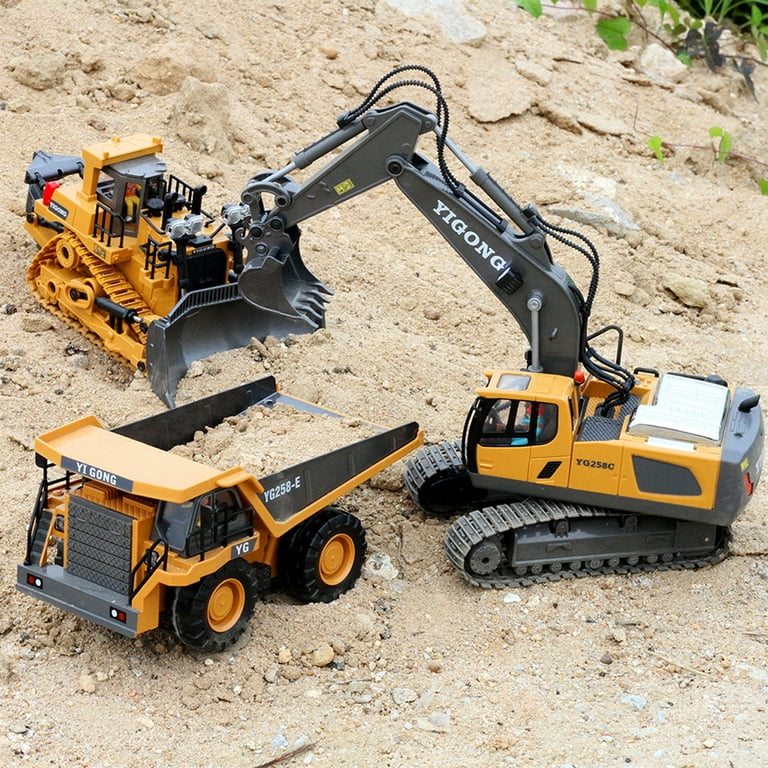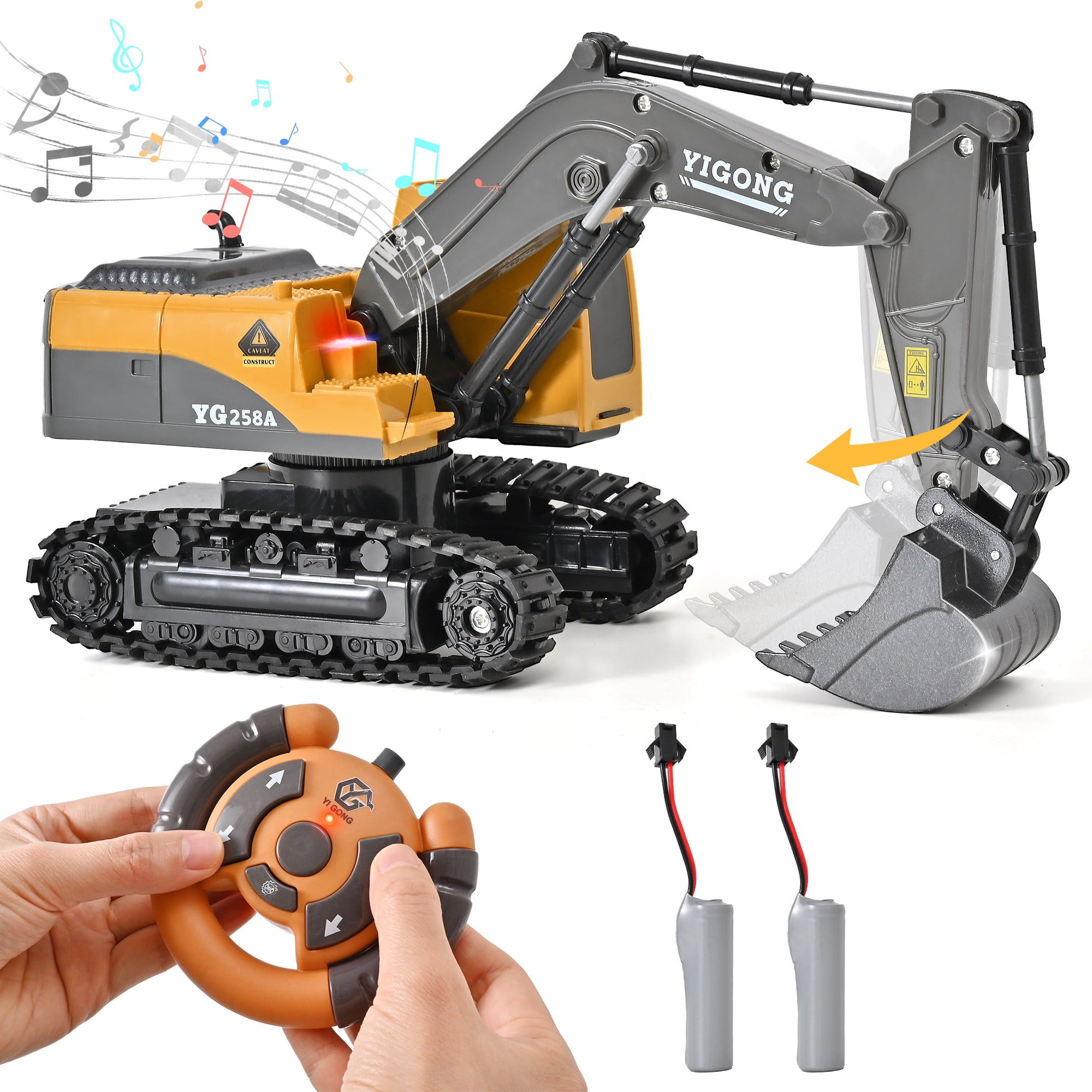Discover the Importance of Excavator in Modern Construction Projects
Excavators are important tools in contemporary building and construction projects. Their convenience allows them to carry out a large variety of tasks, from excavating and grading to demolition and site prep work. Advanced attributes, such as hydraulic add-ons and general practitioners, improve their capacities and effectiveness on task websites. As the industry progresses, the significance of excavators grows a lot more. Recognizing their duty can expose understandings into the future of building practices. What lies ahead for these machines?
The Versatility of Excavators in Different Projects
Although excavators are often connected with massive building and construction tasks, their convenience permits them to be used in a large range of applications, from household landscape design to utility maintenance. In city setups, excavators can navigate tight rooms to dig structures for homes or mount water drainage systems. Their ability to carry out delicate jobs makes them perfect for landscaping jobs, where they can excavate for fish ponds or plant trees. Additionally, excavators play an important role in utility upkeep, successfully excavating trenches for pipelines or cable televisions without disrupting surrounding locations. In agricultural applications, they assist in land clearing and soil preparation. Their adaptability enables them to be equipped with numerous accessories, enhancing their performance throughout different tasks. This multifaceted nature of excavators not only streamlines numerous building and construction procedures yet also demonstrates their integral function in modern-day infrastructure growth and upkeep.
Key Functions and Kinds of Excavators
The conversation on essential features and sorts of excavators highlights the vital attributes that make these equipments indispensable in building. Numerous excavator types, each developed for particular jobs, demonstrate their convenience and performance across different applications. rc excavator. Comprehending these functions and categories is crucial for enhancing their usage in modern building and construction tasks
Excavator Types Review
Excavators play a critical duty in modern construction, supplying versatility and effectiveness across different tasks. These hefty equipment systems been available in several kinds, each customized for specific applications. The most common types include crawler excavators, known for their security on unequal surface, and wheeled excavators, which offer greater flexibility on paved surface areas. Tiny excavators are favored for small-scale jobs and limited areas, while long-reach excavators are developed for deep excavating. Furthermore, there are customized excavators, such as hydraulic excavators, which improve power and accuracy. Each type includes special capacities, making them vital for tasks ranging from excavating and grading to demolition and product handling. Understanding these variants allows building and construction professionals to choose the ideal excavator for their task needs.
Trick Includes Explained
Comprehending the vital attributes of excavators boosts their reliable application in construction jobs. Excavators are characterized by their effective hydraulic systems, which give the needed pressure for digging, lifting, and relocating products. Their verbalized arms enable a variety of movement, helping with accurate operations in confined spaces. Additionally, the range of accessories, such as containers, grapples, and augers, increases their convenience to meet various task demands. The size and weight of excavators also add to their security and maneuverability on different surfaces. Innovations in innovation have led to the combination of General practitioner and automation, improving precision and efficiency in excavation jobs. These attributes collectively place excavators as indispensable tools in contemporary construction.
Applications in Building and construction
Transforming building and construction websites, excavators play a crucial duty throughout various applications, varying from household structure projects to massive infrastructure growths. These versatile makers are outfitted for jobs such as digging structures, trenching for energies, and site grading. Different sorts of excavators, including crawler, rolled, and mini excavators, give details benefits customized to the project demands. Spider excavators excel in rough terrains, while wheeled excavators provide mobility on paved surface areas. Tiny excavators are ideal for constrained spaces, making them prominent in urban settings. The effectiveness and power of excavators significantly accelerate construction procedures, making certain timely job conclusion. Their versatility further boosts their relevance, enabling construction teams to take on a diverse selection of challenges efficiently.
Enhancing Efficiency and Performance on Task Sites
Making the most of effectiveness and performance on job websites is a crucial goal in modern building. Excavators play a pivotal function in accomplishing this goal by streamlining various tasks. Their capacity to carry out several functions-- such as grading, excavating, and training-- minimizes the demand for added tools, thus conserving time and resources.Moreover, excavators boost process by allowing for faster conclusion of projects. With innovative attributes like hydraulic attachments and general practitioners modern technology, they can implement accurate procedures that minimize mistakes and revamp. This precision not just enhances the high quality of work but additionally enhances product usage, adding to cost savings.The versatility of excavators allows them to adapt to different website problems, guaranteeing that projects proceed smoothly no matter of challenges. By integrating excavators into building and construction processes, groups can substantially enhance their general efficiency, bring about timely job conclusion and enhanced earnings.
Safety Benefits of Using Excavators
Excavators considerably enhance security on building websites with boosted driver exposure and reduced manual work threats. By offering operators with a clear view of their surroundings, excavators assist to prevent injuries and accidents. Additionally, the machinery decreases the need for workers to participate in dangerous hand-operated jobs, further advertising a much safer job environment.
Improved Operator Exposure
Although building and construction sites can be chaotic and loaded with prospective dangers, boosted operator presence plays an important duty in ensuring security when making use of excavators. Modern excavators are designed with large, unobstructed windows and strategically positioned mirrors, allowing operators to preserve a clear sight of their environments (rc excavator). This improved exposure is critical for detecting pedestrians, other machinery, and numerous challenges, substantially minimizing the threat of accidents. Furthermore, several excavators incorporate sophisticated innovation, such as sensors and cameras, to offer drivers with extra point of views, further boosting awareness. The ability to see more clearly not only help in effective operation however also cultivates a much safer workplace, making it less complicated for operators to navigate intricate building websites without compromising safety and security criteria
Minimized Guidebook Labor Risks
When hands-on labor is decreased with using excavators, numerous safety and security advantages emerge, substantially enhancing the health of building employees. Excavators lessen the physical stress related to hefty training and recurring jobs, effectively reducing the threat of musculoskeletal injuries. By automating processes such as excavating, grading, and relocating products, they enable workers to maintain a more secure range from prospective dangers. Furthermore, excavators are geared up with advanced safety and security features, such as rollover security systems and boosted operator comfort designs, which further safeguard workers on website. The outcome is a substantial decrease in workplace mishaps and injuries, bring about increased efficiency and spirits among construction teams. Ultimately, the fostering of excavators contributes to a more secure and a lot more efficient construction environment.
Excavators in Earthmoving and Website Prep Work
In contemporary building and construction, a considerable section of earthmoving and website preparation jobs counts on the effectiveness and adaptability of excavators. These machines are developed to handle different soil kinds and terrain, making them important for grading, excavating, and trenching tasks. Their hydraulic arms can be geared up with various add-ons, such as augers and buckets, enabling operators to tailor their approach based on specific project requirements.Excavators succeed at moving huge quantities of planet promptly and effectively, which accelerates the overall building timeline. They can browse tight areas and challenging sites where traditional devices may struggle, improving performance. Additionally, the precision of excavators warranties that website preparation follows stringent specifications, lessening the threat of errors that might lead to costly rework.
The Role of Excavators in Demolition Tasks
Excavators play an essential role in demolition jobs, as they have the power and dexterity needed to dismantle frameworks efficiently. Outfitted with numerous add-ons such as hydraulic breakers, shears, and grapples, these equipments can adjust to different demolition requirements, whether about his for little structures or huge commercial websites. Their adaptability enables operators to tackle complex projects while keeping safety and precision.In enhancement to their demolition abilities, excavators promote debris elimination, ensuring that job sites continue to be orderly and safe. By damaging down structures right into workable items, they allow for streamlined cleaning and recycling of materials, lining up with modern sustainability efforts.Moreover, excavators can access tight rooms and browse irregular surface, making them indispensable in urban demolition jobs. On the whole, their durable layout and multifunctionality make excavators a vital possession in the demolition phase of construction, adding significantly to job timelines and performance.


Future Patterns in Excavator Modern Technology and Usage
As the building industry evolves, developments in excavator innovation are poised to transform their usage and efficiency considerably. One considerable trend is the combination of automation and expert system, allowing excavators to operate with marginal human treatment. This change will enhance accuracy in tasks such as grading and trenching, lowering human mistake and raising productivity.Additionally, the rise of hybrid and electrical excavators is shaping a more lasting building setting, reducing carbon emissions and gas costs. Enhanced telematics systems are likewise arising, allowing real-time surveillance of machine performance and maintenance needs, which can result in better operational effectiveness and longer equipment lifespan.Moreover, improvements in attachment innovation are broadening the adaptability of excavators, permitting them to execute a more comprehensive series of jobs. The combination of these trends demonstrates a future where excavators are smarter, greener, and extra versatile, ultimately improving construction task dynamics.
Frequently Asked Questions
Just How Do Excavators Compare to Other Building And Construction Machinery?
Excavators, characterized he has a good point by their versatility and power, master excavating and earthmoving contrasted to other machinery. Their capability to perform different jobs, including lifting and demolition, makes them vital in construction tasks, enhancing general effectiveness.

What Is the Typical Lifespan of an Excavator?
The average lifespan of an excavator usually ranges from 7,000 to 10,000 operating hours, depending on upkeep, usage problems, and model. Proper care can extend this life expectancy, guaranteeing peak performance throughout its operational years.
Just How Are Excavators Preserved for Optimal Efficiency?
Excavators need routine upkeep for peak performance, including regular examinations, fluid checks, filter replacements, and prompt repair work. Implementing a precautionary maintenance schedule assists lengthen their life expectancy and guarantees reliable operation in various building atmospheres.
What Are the Expenses Connected With Purchasing an excavator vs. renting?
The expenses related to renting out versus getting an excavator differ considerably. Leasing offers reduced upfront costs but can gather with time, while acquiring calls for a significant preliminary investment, however provides lasting savings and property ownership advantages.
What Training Is Required to Run an Excavator?
Operating an excavator needs specialized training, typically including safety methods, equipment procedure strategies, and ecological recognition. Accreditation programs usually mandate functional experience, making it possible for drivers to manage various tasks efficiently while ensuring conformity with sector guidelines. The most common kinds include spider excavators, known for their security on uneven surface, check this site out and wheeled excavators, which offer better mobility on paved surface areas. Small excavators are preferred for limited spaces and small-scale tasks, while long-reach excavators are created for deep excavating. In addition, there are specific excavators, such as hydraulic excavators, which improve power and accuracy. Various types of excavators, consisting of crawler, wheeled, and mini excavators, offer details benefits customized to the job needs. Spider excavators excel in rough terrains, while rolled excavators offer movement on smooth surfaces.